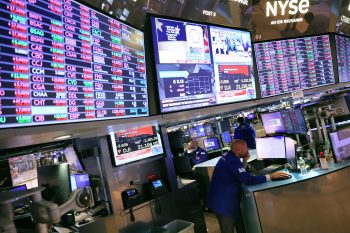The job numbers are discouraging, although the unemployment rate only ticked up .1% in June. I think the worst statistic is how long people are going without a job — a median of four months. That’s twice as long as December of 2007. The number of people unemployed for 7 months has tripled to 4.4 millilon. But hey, Wall Street employees may have little to worry about.
The Wall Street Journal says the way things are going, it could be the good ‘ole days once again for Wall Street workers:
Based on analysts’ earnings forecasts for 2009, Goldman Sachs Group Inc. is on track to pay out as much as $20 billion this year, or about $700,000 per employee. That would be nearly double the firm’s $363,000 average last year, and slightly higher than the $661,000 for the average Goldman employee in fiscal 2007…
Some of the most lucrative pay packages are being offered in businesses that are improving, such as junk-bond trading. Jobs and pay remain iffy in areas like asset-backed securities where markets remain frozen.
Russ Gerson, who runs an executive-recruiting firm that fills jobs on Wall Street, says it is too soon to tell if the strong results from securities firms in the first and second quarters will translate into huge paychecks at the end of the year…
Still, the comeback in compensation so far this year shows how hard it is for Wall Street to break its old habits.
Like touting each other’s stocks. Analysts at Citigroup are telling investors to buy Bank of America shares. Both of these banks are still tethered to TARP. I’m not listening. I’m not listening. More from Marketwatch:
“We believe the firm stands to benefit long term from market-share gains across a variety of businesses, including traditional banking, mortgage origination, retail brokerage, and investment banking,” Citi analysts said in a research note.
They also highlighted Bank of America’s record of making acquisitions and argued that two controversial recent takeovers — namely, Countrywide Financial and Merrill Lynch — offer good growth opportunities for Bank of America when the mortgage and capital markets stabilize and resume their expansion.
On the Marketplace Morning Report, our Washington Bureau Chief John Dimsdale asked why the stimulus package hasn’t created more jobs? One problem…
The stimulus has been spread equally around the country — even though some states have far worse jobless rates than others.
LEE McPHETERS: So the money is distributed by population rather than distributed by where the problems are.
While some argue it’s time to abandon what’s left of the stimulus package, defenders urge patience. It will take a while, they say, for businesses to start hiring new workers.
But the stimulus package has done something. PBS’s NewsHour interviewed Susan Urahn from the Pew Center on the States:
I think it was a critical piece of states’ budgets this year. Overall, the federal stimulus probably filled about 40 percent of the budget gaps that states had to deal with. So without that, there would have been truly devastating cuts likely made in health and human services and education, and corrections, public safety. State government itself would have really faced some problems.
Well, some state governments are still facing serious problems.
Meanwhile, on energy, the House barely passed the climate change bill. The Senate may be looking at other options, besides capping and trading pollution. At Real Clear Markets, Diana Furchtgott-Roth argues it’s time to go nuclear:
Nuclear power has its problems, including delays in licensing and substantial up-front costs, but it can generate additional power for economic growth at a cost lower than that of the cap-and-trade bill.
A nuclear strategy would avoid the experimental and bureaucratic mechanisms for awarding emissions permits to power plants and other polluters and for monitoring compliance and trading, as well as compulsory efficiency standards for automobiles and household appliances and mandatory use of renewable fuels, such as wind, solar, biomass, and hydroelectric power.
There’s a lot happening in the world. Through it all, Marketplace is here for you.
You rely on Marketplace to break down the world’s events and tell you how it affects you in a fact-based, approachable way. We rely on your financial support to keep making that possible.
Your donation today powers the independent journalism that you rely on. For just $5/month, you can help sustain Marketplace so we can keep reporting on the things that matter to you.


















